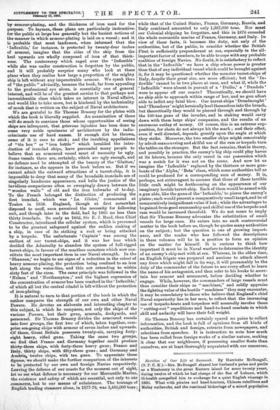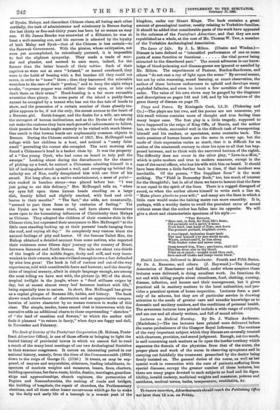Sketches of Our Life at Sarawak. By Harriette McDougall. (S.
P. C. IC.)—Mrs. McDougall shared her husband's pains and perils as a Missionary in the great Eastern island for some twenty years, during twelve of which he had charge of the See of Labuan, which ill-health compelled him to exchange for a quiet English vicarage in 1866. What with pirates and head-bunters, Chinese rebellions and Malay outbreaks, and the continual bickeriogs of a mixed population of Dyaks, Malays, and discordant Chinese clans, all hating each other cordially, the task of administrator and missionary in Borneo during the last thirty or five-and-thirty years has been by no means an easy one. If Sir James Brooke was somewhat of a filibuster, he was at least a well-meaning one, and his success is attested by the loyalty of both Malay and Dyak—that of the Chinese is less certain—to the Sarawak Government. With the pirates, whose extirpation, not even yet accomplished, he relentlessly pursued, it is impossible to feel the slightest sympathy. They made a trade of mur- der and plunder, and seemed to care more, indeed, for the former than the latter branch of their métier. Such of their captives as were not at once " krissed," or tossed overboard, they were in the habit of beating with a flat bamboo till they could not move, in order to " tame " them ; then they harnessed the miserable wretches to the oars of their " prahas," and to keep the night relays awake, "cayenne pepper was rubbed into their eyes, or into cuts dealt them on their arms." Head-hunting is a far more excusable avocation than piracy. In some parts of the island a paddy-farm cannot be occupied by a tenant who has not the due tale of heads to show, and the possession of a certain number of these ghastly tro- phies appears to be, if not the only, the surest avenue to the heart of a Bornean girl. Earth-hunger, and the desire for a wife, are among the strongest of human inclinations, and as the Dyaks of to-day did not make the customs they have such powerful inducements to follow, their passion for heads ought scarcely to be visited with much blame. One result is that human heads are unpleasantly common objects in Borneo. During the Chinese outbreak of 1857, Mrs. McDougall took refuge with her children in a boat, and noticed a "nasty faint smell" pervading the corner she occupied. The next morning she found a Chinaman's head in a basket close by. It was the property of a "fine young Dyak, who had come on board to help pull the sweeps." Looking about during the disturbances for the chance of picking up a head, he noticed a Chinaman admiring himself in a bit of looking-glass stuck against a wall, and creeping up behind the unlucky son of Han, coolly decapitated him with one blow of his sword. Not long after, at a native entertainment, a mess of pulut- rice cooked in bamboo stems—was placed before her. "I was just going to eat this delicacy," Mrs. McDougall tells us, "when my eyes fell upon three human heads standing on a large dish, freshly killed and slightly smoked, with food and sirih leaves in their mouths." " The fact," she adds, not unnaturally, "seemed to part them from us by centuries of feeling." Yet the Dyaks are by no means cruel, and have shown themselves more open to the humanising influences of Christianity than Malaya or Chinese. They adopted the children of their enemies slain in the Chinese riots, but expressed their annoyance to Mrs. McDougall "at the little ones standing looking up at their parents' heads hanging from the roof, and crying all day." So completely may custom blunt the natural feelings of pity and horror. Of the famous Tailed Men, the Bishop obtained a detailed account from some natives, who reported their existence some fifteen days' journey up the country of Bruni, between Sarawak and North Borneo. The tails are about two-thirds of the length of the middle finger, fleshy and stiff, and very incon- venient to their owners, who are civilised enough to own a fort defended by nine iron guns ! The book is full of curious and out-of-the-way experiences, told with considerable force and humour; and the descrip- tions of tropical scenery, albeit in simple language enough, are among
the most telling we have met with, the picture (p. 90) of the short, tropical twilight in the jungle, where a "dead stillness reigns by day, but at sunset almost every leaf becomes instinct with life," being especially true to nature. In short, Mrs. McDougall has given us a capital glimpse of Bornean life, habits, and history. The book shows much shrewdness of observation and an appreciative compre- hension of native character by no means common in works of this class. The simple, tender, home record that is interwoven with the narrative adds an additional charm to these unpretending " sketches" of "the land of sunshine and flowers," to which the author still finds it pleasant "to return in fancy," when days are foggy and dell, in November and February.















































 Previous page
Previous page